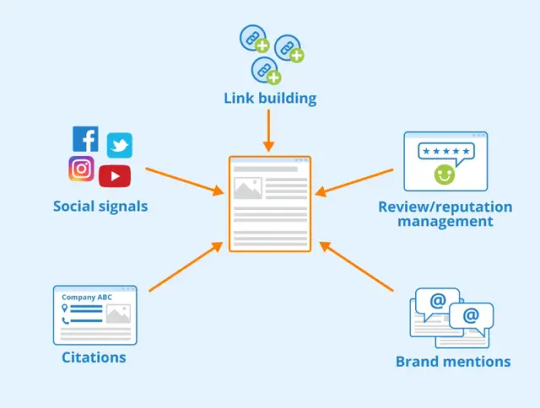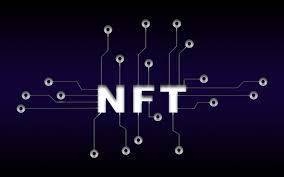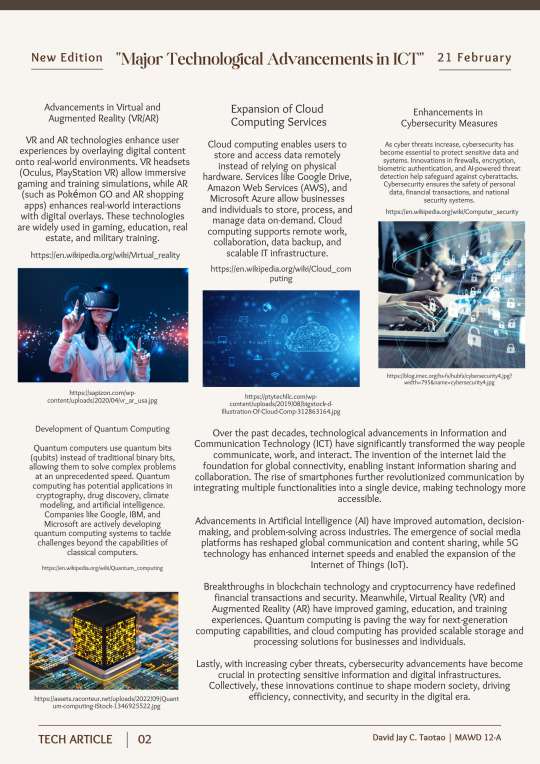#blockchain wiki
Explore tagged Tumblr posts
Text
Oh I've got a fun idea for a unique way to do a story: it's a fictional wiki page documenting the discoveries of a group of reverse engineers trying to figure out how to hack demons. They've got an API to make contracts with demons.
They've figured out to cast spells out of magical code stored in the blockchain (because of course it's a block chain, it's hell)
There's a list of spells people have found, with comments on what they might do, reports on experimentation, and attempts to decode the "source".
Like there's a subsection with a name that won't render properly because you don't have the proper demonic fonts installed, but it's got the reporting name "shinigami eyes". It's a simple divination spell, so called because it makes numbers appear over the heads of people.
They've got a home-patched version to switch it to arabic numerals for the non-hackery who can't read demonic numerals (they're base 6, of course), and they've been slowly brute forcing the different stats they can query.
The first success was a number that represents the number of days it's been since you've visited a library. Apparently that's one of the statistics stored in your the soul! And weirdly, it counts down? The spell has to query the per-person LIBRARY_THRESHOLD and then subtract from it the LIBRARY_CURRENT to get the displayed count.
It could even be real wiki: keep expanding it by adding additional pages for in-universe discoveries, like... the time they figured out how you can get test animals to cast spells from their own soul (which, being without original sin, have effectively infinite reserves).
P. S. Okay that one got me so I can't end here: they have a list of animals it doesn't work with. The implication being that some animals DO have original sin, and even better yet: these hellhackers only figured that out by accidentally selling a horse's soul to Beelzebub.
839 notes
·
View notes
Text
Algorithmic feeds are a twiddler’s playground

Next TUESDAY (May 14), I'm on a livecast about AI AND ENSHITTIFICATION with TIM O'REILLY; on WEDNESDAY (May 15), I'm in NORTH HOLLYWOOD with HARRY SHEARER for a screening of STEPHANIE KELTON'S FINDING THE MONEY; FRIDAY (May 17), I'm at the INTERNET ARCHIVE in SAN FRANCISCO to keynote the 10th anniversary of the AUTHORS ALLIANCE.

Like Oscar Wilde, "I can resist anything except temptation," and my slow and halting journey to adulthood is really just me grappling with this fact, getting temptation out of my way before I can yield to it.
Behavioral economists have a name for the steps we take to guard against temptation: a "Ulysses pact." That's when you take some possibility off the table during a moment of strength in recognition of some coming moment of weakness:
https://archive.org/details/decentralizedwebsummit2016-corydoctorow
Famously, Ulysses did this before he sailed into the Sea of Sirens. Rather than stopping his ears with wax to prevent his hearing the sirens' song, which would lure him to his drowning, Ulysses has his sailors tie him to the mast, leaving his ears unplugged. Ulysses became the first person to hear the sirens' song and live to tell the tale.
Ulysses was strong enough to know that he would someday be weak. He expressed his strength by guarding against his weakness. Our modern lives are filled with less epic versions of the Ulysses pact: the day you go on a diet, it's a good idea to throw away all your Oreos. That way, when your blood sugar sings its siren song at 2AM, it will be drowned out by the rest of your body's unwillingness to get dressed, find your keys and drive half an hour to the all-night grocery store.
Note that this Ulysses pact isn't perfect. You might drive to the grocery store. It's rare that a Ulysses pact is unbreakable – we bind ourselves to the mast, but we don't chain ourselves to it and slap on a pair of handcuffs for good measure.
People who run institutions can – and should – create Ulysses pacts, too. A company that holds the kind of sensitive data that might be subjected to "sneak-and-peek" warrants by cops or spies can set up a "warrant canary":
https://en.wikipedia.org/wiki/Warrant_canary
This isn't perfect. A company that stops publishing regular transparency reports might have been compromised by the NSA, but it's also possible that they've had a change in management and the new boss just doesn't give a shit about his users' privacy:
https://www.fastcompany.com/90853794/twitters-transparency-reporting-has-tanked-under-elon-musk
Likewise, a company making software it wants users to trust can release that code under an irrevocable free/open software license, thus guaranteeing that each release under that license will be free and open forever. This is good, but not perfect: the new boss can take that free/open code down a proprietary fork and try to orphan the free version:
https://news.ycombinator.com/item?id=39772562
A company can structure itself as a public benefit corporation and make a binding promise to elevate its stakeholders' interests over its shareholders' – but the CEO can still take a secret $100m bribe from cryptocurrency creeps and try to lure those stakeholders into a shitcoin Ponzi scheme:
https://fortune.com/crypto/2024/03/11/kickstarter-blockchain-a16z-crypto-secret-investment-chris-dixon/
A key resource can be entrusted to a nonprofit with a board of directors who are charged with stewarding it for the benefit of a broad community, but when a private equity fund dangles billions before that board, they can talk themselves into a belief that selling out is the right thing to do:
https://www.eff.org/deeplinks/2020/12/how-we-saved-org-2020-review
Ulysses pacts aren't perfect, but they are very important. At the very least, creating a Ulysses pact starts with acknowledging that you are fallible. That you can be tempted, and rationalize your way into taking bad action, even when you know better. Becoming an adult is a process of learning that your strength comes from seeing your weaknesses and protecting yourself and the people who trust you from them.
Which brings me to enshittification. Enshittification is the process by which platforms betray their users and their customers by siphoning value away from each until the platform is a pile of shit:
https://en.wikipedia.org/wiki/Enshittification
Enshittification is a spectrum that can be applied to many companies' decay, but in its purest form, enshittification requires:
a) A platform: a two-sided market with business customers and end users who can be played off against each other; b) A digital back-end: a market that can be easily, rapidly and undetectably manipulated by its owners, who can alter search-rankings, prices and costs on a per-user, per-query basis; and c) A lack of constraint: the platform's owners must not fear a consequence for this cheating, be it from competitors, regulators, workforce resignations or rival technologists who use mods, alternative clients, blockers or other "adversarial interoperability" tools to disenshittify your product and sever your relationship with your users.
he founders of tech platforms don't generally set out to enshittify them. Rather, they are constantly seeking some equilibrium between delivering value to their shareholders and turning value over to end users, business customers, and their own workers. Founders are consummate rationalizers; like parenting, founding a company requires continuous, low-grade self-deception about the amount of work involved and the chances of success. A founder, confronted with the likelihood of failure, is absolutely capable of talking themselves into believing that nearly any compromise is superior to shuttering the business: "I'm one of the good guys, so the most important thing is for me to live to fight another day. Thus I can do any number of immoral things to my users, business customers or workers, because I can make it up to them when we survive this crisis. It's for their own good, even if they don't know it. Indeed, I'm doubly moral here, because I'm volunteering to look like the bad guy, just so I can save this business, which will make the world over for the better":
https://locusmag.com/2024/05/cory-doctorow-no-one-is-the-enshittifier-of-their-own-story/
(En)shit(tification) flows downhill, so tech workers grapple with their own version of this dilemma. Faced with constant pressure to increase the value flowing from their division to the company, they have to balance different, conflicting tactics, like "increasing the number of users or business customers, possibly by shifting value from the company to these stakeholders in the hopes of making it up in volume"; or "locking in my existing stakeholders and squeezing them harder, safe in the knowledge that they can't easily leave the service provided the abuse is subtle enough." The bigger a company gets, the harder it is for it to grow, so the biggest companies realize their gains by locking in and squeezing their users, not by improving their service::
https://pluralistic.net/2023/07/28/microincentives-and-enshittification/
That's where "twiddling" comes in. Digital platforms are extremely flexible, which comes with the territory: computers are the most flexible tools we have. This means that companies can automate high-speed, deceptive changes to the "business logic" of their platforms – what end users pay, how much of that goes to business customers, and how offers are presented to both:
https://pluralistic.net/2023/02/19/twiddler/
This kind of fraud isn't particularly sophisticated, but it doesn't have to be – it just has to be fast. In any shell-game, the quickness of the hand deceives the eye:
https://pluralistic.net/2024/03/26/glitchbread/#electronic-shelf-tags
Under normal circumstances, this twiddling would be constrained by counterforces in society. Changing the business rules like this is fraud, so you'd hope that a regulator would step in and extinguish the conduct, fining the company that engaged in it so hard that they saw a net loss from the conduct. But when a sector gets very concentrated, its mega-firms capture their regulators, becoming "too big to jail":
https://pluralistic.net/2022/06/05/regulatory-capture/
Thus the tendency among the giant tech companies to practice the one lesson of the Darth Vader MBA: dismissing your stakeholders' outrage by saying, "I am altering the deal. Pray I don't alter it any further":
https://pluralistic.net/2023/10/26/hit-with-a-brick/#graceful-failure
Where regulators fail, technology can step in. The flexibility of digital platforms cuts both ways: when the company enshittifies its products, you can disenshittify it with your own countertwiddling: third-party ink-cartridges, alternative app stores and clients, scrapers, browser automation and other forms of high-tech guerrilla warfare:
https://www.eff.org/deeplinks/2019/10/adversarial-interoperability
But tech giants' regulatory capture have allowed them to expand "IP rights" to prevent this self-help. By carefully layering overlapping IP rights around their products, they can criminalize the technology that lets you wrestle back the value they've claimed for themselves, creating a new offense of "felony contempt of business model":
https://locusmag.com/2020/09/cory-doctorow-ip/
A world where users must defer to platforms' moment-to-moment decisions about how the service operates, without the protection of rival technology or regulatory oversight is a world where companies face a powerful temptation to enshittify.
That's why we've seen so much enshittification in platforms that algorithmically rank their feeds, from Google and Amazon search to Facebook and Twitter feeds. A search engine is always going to be making a judgment call about what the best result for your search should be. If a search engine is generally good at predicting which results will please you best, you'll return to it, automatically clicking the first result ("I'm feeling lucky").
This means that if a search engine slips in the odd paid result at the top of the results, they can exploit your trusting habits to shift value from you to their investors. The congifurability of a digital service means that they can sprinkle these frauds into their services on a random schedule, making them hard to detect and easy to dismiss as lapses. Gradually, this acquires its own momentum, and the platform becomes addicted to lowering its own quality to raise its profits, and you get modern Google, which cynically lowered search quality to increase search volume:
https://pluralistic.net/2024/04/24/naming-names/#prabhakar-raghavan
And you get Amazon, which makes $38 billion every year, accepting bribes to replace its best search results with paid results for products that cost more and are of lower quality:
https://pluralistic.net/2023/11/06/attention-rents/#consumer-welfare-queens
Social media's enshittification followed a different path. In the beginning, social media presented a deterministic feed: after you told the platform who you wanted to follow, the platform simply gathered up the posts those users made and presented them to you, in reverse-chronological order.
This presented few opportunities for enshittification, but it wasn't perfect. For users who were well-established on a platform, a reverse-chrono feed was an ungovernable torrent, where high-frequency trivialities drowned out the important posts from people whose missives were buried ten screens down in the updates since your last login.
For new users who didn't yet follow many people, this presented the opposite problem: an empty feed, and the sense that you were all alone while everyone else was having a rollicking conversation down the hall, in a room you could never find.
The answer was the algorithmic feed: a feed of recommendations drawn from both the accounts you followed and strangers alike. Theoretically, this could solve both problems, by surfacing the most important materials from your friends while keeping you abreast of the most important and interesting activity beyond your filter bubble. For many of us, this promise was realized, and algorithmic feeds became a source of novelty and relevance.
But these feeds are a profoundly tempting enshittification target. The critique of these algorithms has largely focused on "addictiveness" and the idea that platforms would twiddle the knobs to increase the relevance of material in your feed to "hack your engagement":
https://www.theguardian.com/technology/2018/mar/04/has-dopamine-got-us-hooked-on-tech-facebook-apps-addiction
Less noticed – and more important – was how platforms did the opposite: twiddling the knobs to remove things from your feed that you'd asked to see or that the algorithm predicted you'd enjoy, to make room for "boosted" content and advertisements:
https://www.reddit.com/r/Instagram/comments/z9j7uy/what_happened_to_instagram_only_ads_and_accounts/
Users were helpless before this kind of twiddling. On the one hand, they were locked into the platform – not because their dopamine had been hacked by evil tech-bro wizards – but because they loved the friends they had there more than they hated the way the service was run:
https://locusmag.com/2023/01/commentary-cory-doctorow-social-quitting/
On the other hand, the platforms had such an iron grip on their technology, and had deployed IP so cleverly, that any countertwiddling technology was instantaneously incinerated by legal death-rays:
https://techcrunch.com/2022/10/10/google-removes-the-og-app-from-the-play-store-as-founders-think-about-next-steps/
Newer social media platforms, notably Tiktok, dispensed entirely with deterministic feeds, defaulting every user into a feed that consisted entirely of algorithmic picks; the people you follow on these platforms are treated as mere suggestions by their algorithms. This is a perfect breeding-ground for enshittification: different parts of the business can twiddle the knobs to override the algorithm for their own parochial purposes, shifting the quality:shit ratio by unnoticeable increments, temporarily toggling the quality knob when your engagement drops off:
https://www.forbes.com/sites/emilybaker-white/2023/01/20/tiktoks-secret-heating-button-can-make-anyone-go-viral/
All social platforms want to be Tiktok: nominally, that's because Tiktok's algorithmic feed is so good at hooking new users and keeping established users hooked. But tech bosses also understand that a purely algorithmic feed is the kind of black box that can be plausibly and subtly enshittified without sparking user revolts:
https://pluralistic.net/2023/01/21/potemkin-ai/#hey-guys
Back in 2004, when Mark Zuckerberg was coming to grips with Facebook's success, he boasted to a friend that he was sitting on a trove of emails, pictures and Social Security numbers for his fellow Harvard students, offering this up for his friend's idle snooping. The friend, surprised, asked "What? How'd you manage that one?"
Infamously, Zuck replied, "People just submitted it. I don't know why. They 'trust me.' Dumb fucks."
https://www.esquire.com/uk/latest-news/a19490586/mark-zuckerberg-called-people-who-handed-over-their-data-dumb-f/
This was a remarkable (and uncharacteristic) self-aware moment from the then-nineteen-year-old Zuck. Of course Zuck couldn't be trusted with that data. Whatever Jiminy Cricket voice told him to safeguard that trust was drowned out by his need to boast to pals, or participate in the creepy nonconsensual rating of the fuckability of their female classmates. Over and over again, Zuckerberg would promise to use his power wisely, then break that promise as soon as he could do so without consequence:
https://papers.ssrn.com/sol3/papers.cfm?abstract_id=3247362
Zuckerberg is a cautionary tale. Aware from the earliest moments that he was amassing power that he couldn't be trusted with, he nevertheless operated with only the weakest of Ulysses pacts, like a nonbinding promise never to spy on his users:
https://web.archive.org/web/20050107221705/http://www.thefacebook.com/policy.php
But the platforms have learned the wrong lesson from Zuckerberg. Rather than treating Facebook's enshittification as a cautionary tale, they've turned it into a roadmap. The Darth Vader MBA rules high-tech boardrooms.
Algorithmic feeds and other forms of "paternalistic" content presentation are necessary and even desirable in an information-rich environment. In many instances, decisions about what you see must be largely controlled by a third party whom you trust. The audience in a comedy club doesn't get to insist on knowing the punchline before the joke is told, just as RPG players don't get to order the Dungeon Master to present their preferred challenges during a campaign.
But this power is balanced against the ease of the players replacing the Dungeon Master or the audience walking out on the comic. When you've got more than a hundred dollars sunk into a video game and an online-only friend-group you raid with, the games company can do a lot of enshittification without losing your business, and they know it:
https://www.theverge.com/2024/5/10/24153809/ea-in-game-ads-redux
Even if they sometimes overreach and have to retreat:
https://www.eurogamer.net/sony-overturns-helldivers-2-psn-requirement-following-backlash
A tech company that seeks your trust for an algorithmic feed needs Ulysses pacts, or it will inevitably yield to the temptation to enshittify. From strongest to weakest, these are:
Not showing you an algorithmic feed at all;
https://joinmastodon.org/
"Composable moderation" that lets multiple parties provide feeds:
https://bsky.social/about/blog/4-13-2023-moderation
Offering an algorithmic "For You" feed alongside of a reverse-chrono "Friends" feed, defaulting to friends;
https://pluralistic.net/2022/12/10/e2e/#the-censors-pen
As above, but defaulting to "For You"
Maturity lies in being strong enough to know your weaknesses. Never trust someone who tells you that they will never yield to temptation! Instead, seek out people – and service providers – with the maturity and honesty to know how tempting temptation is, and who act before temptation strikes to make it easier to resist.

If you'd like an essay-formatted version of this post to read or share, here's a link to it on pluralistic.net, my surveillance-free, ad-free, tracker-free blog:
https://pluralistic.net/2024/05/11/for-you/#the-algorithm-tm

Image: Cryteria (modified) https://commons.wikimedia.org/wiki/File:HAL9000.svg
CC BY 3.0 https://creativecommons.org/licenses/by/3.0/deed.en
--
djhughman https://commons.wikimedia.org/wiki/File:Modular_synthesizer_-_%22Control_Voltage%22_electronic_music_shop_in_Portland_OR_-_School_Photos_PCC_%282015-05-23_12.43.01_by_djhughman%29.jpg
CC BY 2.0 https://creativecommons.org/licenses/by/2.0/deed.en
#pluralistic#twiddling#for you#enshittification#intermediation#the algorithm tm#moral hazard#end to end
113 notes
·
View notes
Note
I have no one levelheaded to discuss this stupid band with so I'm directing this to you but. Oh my god the way he constantly complains about having no hits is making me crazy. I get some of the frustration w fbr I guess but I feel like he's focused so hard on that and is scrambling to blame someone for them not being in arenas as if funeral grey radio play would have propelled them into household name superstars. They're not the world's biggest band but he genuinely seems so bitter they're not 21p or fob when they're doing well considering how the music industry is. It honestly puts a weirder taste in my mouth than the favoritism idgaf about that

here's what anon is referring to for context but wow still bitter as he was in 2022 when he was realizing they were going nowhere even with a label that famously fucks people over unless they're marketable enough but hey at least instead of lashing out at his own fans that provide for him he identified at least on source of his failures can't say that about every man's problems. too bad he didn't realize one of the problems was himself so that's another loss for self realization.
(can i also point out how he's clearly trying to play victim in a situation he brought attention to like yes this label is bad but are you trying to get them on your ass by saying the quiet part out loud????)
this pursuit shouldn't be surprising honestly, awsten always talks about wanting to be a pop star and is the worst with labels and fbr is one of the most draining alternative labels out there for trying to make every one of their artists a pop star and dump them if they're not marketable enough.
if you wanted to go deeper, i guess you could also root some of awsten's own obsession over business and metrics affecting the quality and reception to his works back to the people he looks up to/has boosted parx's career and him naturally adopting those habits in his own way. big example right now is finn mckenty aka the punk rock mba. parx got their start posting their music videos on his old music site, stuffyouwillhate.com which was a blog that covered alternative music and awsten has hung out with him irl on a tour stop in the past couple of years. and despite all this music stuff, finn has retired from his youtube channel because he says he actually hates music and only cares about money and essentially does a wiki read on all the bands he covers because he only cares about marketing. yeah sure okay dickbag at least you're being honest now but spewing out slop and blaming the market instead of going against your own interests is stupid lol.
don't even get me started on the maddens and their fucking outputs and crypto bro isms bleeding into everything they do. they had good songs i'll admit but that was like over ten years ago and even since they reunited, they haven't put out a new album since then to focus on stuff like buying altpress and attempting to cater to their decidedly alternative fanbase by shoehorning joel madden's podcasts (usually with mddn artists, most of which have dropped them as management at this point including parx) every fucking week and trying to make web3 stuff a thing on there for a couple years when PEOPLE ONLY FUCKING CARE ABOUT MUSIC AND NOT STUPID ATTEMPTS TO MAKE MONEY OFF OF BLOCKCHAIN DOLL MAKERS
ugh anyways you can already see some of these patterns and habits in awsten the real big difference is he genuinely does love music and making things and producing and being insane with thousands of demos but sometimes the business side gets the best of him thinking it must be transactional that because of the amount of insane work he can put into making even just one mixed and mastered song warrants success and if they don't get it, he will beg and barter his way with fans into getting enough streams for him to get one taco in houston or lash out when someone points out a flaw in that thinking because obviously he can't possibly be part of the reason waterparks isn't getting any bigger but just gaining a small portion of more insane fans who want to tear him to pieces and fuck the wounds all while he goes more insane with them because if he doesn't have the success he wants, he at least wants the consistent attention and affection he can get from fans that don't turn on him.
but yeah, sure funeral grey could've been a pop radio hit but maybe other things that led him to now could've changed too. - iz
#sorry this was long and rantier than i expected myself but i've done a lot of Thinking of awsten's position#as someone in 'the scene' vs as a desperate marketer trying to fund the next insane thing or $300 shirt#and obviously this is a systemic fault of the music industry vs artists but also holy shit awsten is difficult to work with#and drains the life out of his own creative work in order to fund the next one that's already being drained and dead in the water#unless he barters and plays games no one actually cares about
14 notes
·
View notes
Text
Top 10+ Free Forum Posting Sites List for 2024
In the digital age, where connections are made with a click and conversations span continents, online forums remain a cornerstone of the internet community.

These virtual gathering places serve as hubs of discussion, information exchange, and camaraderie for individuals with shared interests. Whether you're seeking advice, sharing knowledge, or simply engaging in lively debates, forums offer a platform where voices can be heard and connections can be forged. In this ever-evolving landscape, here are ten free forum posting sites that stand out as beacons of community in 2024.
1. Proko
Website: Proko
Artists and art enthusiasts converge on Proko's forum, where discussions range from technique tips to critique sessions, fostering a supportive community of creatives.
2. Rocket Software
Website: Rocket Software
With a focus on technology and software development, Rocket Software's forum provides a platform for professionals to share insights, troubleshoot issues, and collaborate on projects.
3. Roomstyler
Website: Roomstyler
Interior design aficionados gather on Roomstyler's forum to exchange ideas, showcase their designs, and seek inspiration for their next home decor project.
4. Ads of the World
Website: Ads of the World
Marketers, advertisers, and creative minds converge on Ads of the World's forum to dissect the latest ad campaigns, share industry insights, and brainstorm ideas for future projects.
5. RoutineHub
Website: RoutineHub
Developers and enthusiasts of iOS shortcuts gather on RoutineHub's forum to share their creations, troubleshoot issues, and collaborate on new shortcut ideas to streamline daily tasks.
6. Reddcoin Wiki
Website: Reddcoin Wiki
Crypto enthusiasts and supporters of Reddcoin engage in discussions on the Reddcoin Wiki forum, sharing news, updates, and insights into the world of digital currencies and blockchain technology.
7. Plaza Pública CDMX
Website: Plaza Pública CDMX
Citizens of Mexico City gather on Plaza Pública CDMX's forum to discuss local issues, share resources, and organize community events, fostering civic engagement and participation.
8. Kitsu
Website: Kitsu
Anime and manga fans unite on Kitsu's forum to discuss their favorite series, recommend new titles, and connect with like-minded individuals who share their passion for Japanese pop culture.
9. Glitch
Website: Glitch
Developers and creators converge on Glitch's forum to share coding tips, troubleshoot issues, and collaborate on projects using Glitch's collaborative coding platform.
10. Product Hunt
Website: Product Hunt
Entrepreneurs, innovators, and tech enthusiasts gather on Product Hunt's forum to discover and discuss the latest products, apps, and startups making waves in the digital world.

In a world where digital connections often feel fleeting and ephemeral, online forums offer a sense of community and belonging that transcends geographical boundaries. Whether you're a seasoned professional seeking to expand your network or a hobbyist looking to connect with others who share your passions, these free forum posting sites provide a platform where voices can be heard, ideas can be exchanged, and meaningful connections can be forged. So dive in, join the conversation, and become a part of the vibrant online communities that define the internet landscape in 2024.
8 notes
·
View notes
Text
The Evolution of Web 2.0
The Evolution of Web 2.0: Transforming the Internet Experience
The internet has come a long way since its inception, and one of the most significant milestones in its evolution is Web 2.0. This term, first coined in the early 2000s, represents the shift from static web pages to dynamic, user-driven platforms. With the rise of social media, user-generated content, and interactive online services, Web 2.0 has revolutionized the way we connect, communicate, and create.

What is Web 2.0?
In simple terms, Web 2.0 refers to the transformation of the web into a more interactive and collaborative space. Unlike its predecessor, Web 1.0, which primarily consisted of static websites where users could only consume content, Web 2.0 allows users to actively participate in the creation and sharing of information. This paradigm shift has led to the rise of social networks, blogs, wikis, and other platforms that encourage collaboration and community building.
Key Features of Web 2.0:
User-Generated Content: Platforms like YouTube, Twitter, and Wikipedia have made it easier than ever for users to create and share their own content, whether it's videos, articles, or social media posts.
Social Networking: Facebook, Instagram, and LinkedIn are prime examples of Web 2.0's emphasis on building online communities where people can connect, share experiences, and collaborate.
Interactive Interfaces: Technologies like AJAX and APIs enable more dynamic, responsive web pages that allow real-time updates without refreshing the page. This has greatly enhanced the user experience, particularly on social media platforms.
Rich User Experiences: Web 2.0 applications are designed with the user in mind, making it easy to navigate, interact with, and personalize their online experiences.
The Impact of Web 2.0 on Digital Culture
Web 2.0 has empowered individuals to have a voice in the digital world. Blogs, forums, and social media platforms have democratized content creation, giving anyone with an internet connection the ability to publish their thoughts, ideas, and creations to a global audience.
For businesses, this shift has created new opportunities for engagement with consumers. Brands are now able to interact with customers directly through social media platforms, fostering a sense of community and loyalty.
Moreover, the rise of influencers and content creators on platforms like YouTube and Instagram has changed the landscape of marketing. People trust recommendations from peers and influencers more than traditional advertising, and brands have quickly adapted to this new form of communication.
What’s Next After Web 2.0?
As technology continues to advance, discussions around the next phase of the web—often referred to as Web 3.0—have begun. While Web 2.0 focuses on user interaction and community-driven content, Web 3.0 promises to take things even further by incorporating artificial intelligence, machine learning, and decentralized technologies like blockchain. In this new era, the web could become even more personalized, secure, and user-centric.
Conclusion
Web 2.0 has truly transformed the way we interact with the internet, bringing about an age of collaboration, connection, and creativity. As we look forward to the future, it's exciting to imagine how the web will continue to evolve and shape our digital experiences.
What are your thoughts on the future of the web? Share in the comments below!
For more details on the history and significance of Web 2.0, check out these sources:
The History of Web 2.0
Understanding Web 2.0 Concept
#Web2point0#InternetEvolution#DigitalCulture#TechTrends#WebHistory#SocialMediaRevolution#UserGeneratedContent#FutureOfTheWeb#WebTechnology#InteractiveWeb
3 notes
·
View notes
Note
I think that there is definitely a place for AI, but it just feels like the companies behind it are trying to make their products the answer to everything, even when it doesn’t make sense, like when crypto and blockchain were starting
Like I don’t want AI writing wikis, that should just be a data entry any prediction on that part is a problem and probably inaccurate
Or an article trying to tell me how a blue moon actually gives of blue light
Like every good tool it should be the answer to a problem, but the problem popular AI seems to be solving is companies don’t want to pay people for content
But your examples of someone making their own models and sourcing their own data is fine in my opinion
oh absolutely, in no fuckin universe is AI any sort of replacement for a human being with fact checking capabilities and the ability to actually know and understand things. Most of its current use within industry is a load of grifter shit, and I'll be surprised if it works out in the long run with how hard it is for companies to like...actually turn any sort of profit with it lmao. Yeah no my advocacy for generative art starts with 'harmless (and clearly labeled) goofs' and ends with 'one of many items in an artist's toolkit'. ChatGPT in particular has materially made the internet worse and in a hilarious twist of fate has output so much garbage that its made ITSELF worse.
13 notes
·
View notes
Text
WikiGlitz

Hello! Welcome to Wiki Glitz, your ultimate platform for engaging and diverse content in the world of technology. We are dedicated to providing you with the latest insights, trends, tips, and expert advice to enrich your knowledge and keep you ahead in the tech world.
WikiGlitz aims to inform and inspire by covering a wide range of topics such as Artificial Intelligence (AI), Cyber Security, Cloud Computing, Internet of Things (IoT), VR and AR, Blockchain, Software Development, Sustainable Technology, and other emerging technology trends. We provide free resources to help you stay informed and empowered.
Our goal is to keep you updated, entertained, and enlightened, ensuring a well-rounded and balanced approach to your interests and needs in technology. For more details please visit https://wikiglitz.co/blog/
#virtual reality#augmented reality#blockchain technology#blockchain#ai technology#technology#technology tips#chatgpt#gemini ai#cloud computing#machine learning#latest technology in artificial intelligence#future of artificial intelligence#renewable energy and sustainability#biotechnology and genetic engineering#quantum computing#virtual and augmented reality (vr/ar)#internet of things (iot)#blockchain and cryptocurrency#artificial intelligence (ai)#brain-computer interfaces#robotics#cybersecurity#big data and analytics#space exploration#materials science#nanotechnology#artificial general intelligence (agi)#brain-computer interfaces (bcis)
1 note
·
View note
Text
Que sont les "NFT" et leurs limites ?

Pour commencer, présentons la notion d’un NFT et de sa participation dans le domaine de l’art numérique. Un NFT de l’anglais Non-Fungible Token est un fichier de données non fongibles se trouvant généralement sur une blockchain (chaîne numérique qui permet de stocker et de transmettre des informations) afin de garantir l’authenticité d’une œuvre, de sa reproduction et même de sa création. Cette technique d’art à été principalement reconnue en 2017. Ces tokens (jetons) ont pour but de donner des droits à l’individu qui le possède, sur une œuvre numérique. Un NFT est raccordée à la notion de crypto-monnaies car ils se trouvent le plus souvent sur une même blockchain. Pour éviter toute confusion, un NFT en lui même n’est pas une œuvre d’art et est juste l’accompagnement d’une œuvre d’art, d’une musique, de vidéos ou de biens virtuels dans son accessibilité et son authenticité.
Mais l’authenticité d’une œuvre d’art numérique reste un problème majeur dans les NFT. En effet, revendiquer l’œuvre d’art n’empêche pas les personnes tiers de copier et de partager l’œuvre sans aucun coût monétaire. De ce fait, une véritable guerre entre les détenteurs et les voleurs ne cesse de se produire sur les blockchains. En effet, trouver une photo sur le net de photos tendance reliées à des NFT prend en faite quelques secondes. Comme cette image qui m'a prit 10 secondes afin de la trouver.

Le point principal sur les NFT, c’est comment cela se passe au niveau des règles et de la loi. On se pose la question de, si on achète un NFT, il nous appartient mais avons nous le droit en tant que détenteur, de reproduire l’œuvre et/ou de la modifier. Cette problématique touche aussi l’autre côté, qu’est ce qui pourrait empêcher, sur le net, de reproduire une œuvre d’art qui ne nous appartient pas ? Les conséquences sont présentent bien que les risques, eux, soient minimes. Et puis ça nous permet de rebondir sur l’authenticité de cette œuvre. Le faite de la reproduire fait que les acheteurs ne peuvent pas savoir si l’œuvre est authentique. Dans la vie de tous les jours, ce qui rend une œuvre unique est le faite de mettre en exposition (publique ou privée) un seul et même art. Mais sur internet, tout est différent car la reproduction peut se faire à la perfection sans réel effort. Cette perspective de faux et vrai montre la limite principal d’une œuvre d’art numérique.
Mais il est tout autant important de parler de ce que la société à fait des NFT, c’est à dire, finalement, quelle est leur idée et les valeurs d’acquérir un NFT. Tout d’abord, il est naturel de dire que les NFT ont pour but d’avoir la propriété d’une œuvre à travers des transaction. Cela se transformera vite en quelque chose d’économique. L’art numérique autour des NFT est devenu un pour une majeure partie des individus, un avantage monétaire et aucune reconnaissance dans cet art, c’est à dire, pour certains, le but est uniquement de s’enrichir et cela pose évidemment des question de morale sur l’utilité des NFT dans une société. Car, ayant ceci comme un des buts principaux, le prix d’un NFT peut varier et sa volatilité est sans limite. De ce fait, les gens ont peur de cette pratique d’enrichissement car la prévision de la variation des prix ne peut pas se faire par des débutants.
En fin de compte, les NFT peuvent être appréciés ou détestés. Ce sont des moyens d’enrichissement à travers l’utilisation des arts numériques sans réellement s’y appuyer et cela fait encore débat de nos jours. Se dire que nous achetons un bien afin qu’il nous revienne uniquement de droit et que nous la voyons (notre œuvre) partout sur le net, montre évidemment un point négatif très visible sur la pratique des NFT, le plagiat. Le principe de NFT reste tout de même l'acquisition d'un art numérique afin qu'il nous appartienne, de ce fait, malgré les défauts de la pratique, il reste un moyen de création, de partage d'arts.

Alexandre Pessaux
Sources: généralement mes connaissances et Wikipédia pour me souvenir de certaines notions
2 notes
·
View notes
Text
didn't we do this already? I'm really pretty sure we did this already, and enough of fandom collectively said "fuck this and fuck you" to hit critical mass on founding @transformativeworks @ao3org
oh hey look, @fanlore-wiki has extensive discussion of exactly the same thing only without the blockchain T-shirt and ChatGPT hat:

hello my loves <3 do not ever, ever, ever "officially" create for an IP that you have not signed a vetted contract to be paid for. this is a tactic companies use to get a free writer's room they don't have to pay for. you won't see a cent and they will own your work. don't do it.
15K notes
·
View notes
Text
Kristof Schoffling Monaco
Enhance your understanding of Kristof Schoffling Monaco is entrepreneur known for his expertise in digital assets, blockchain technology, and fintech innovation. With a strong background in business development, Schoffling has played a key role in advancing decentralized finance (DeFi) solutions and emerging financial technologies. His strategic insights and leadership have contributed to the success of various ventures in the digital economy. Based in Monaco, he continues to drive innovation by investing in cutting-edge projects and fostering growth in the fintech sector. Schoffling’s forward-thinking approach positions him as a leader in the rapidly evolving world of digital finance. His commitment to leveraging blockchain for financial transformation highlights his influence in shaping the future of decentralized financial ecosystems.
1 note
·
View note
Text
Wiki Finance Expo Hong Kong 2025
The Future of Finance is Here 🚀
If fintech, crypto, and blockchain excite you, then Wiki Finance Expo Hong Kong 2025 is where you need to be. On March 27, industry leaders, investors, and startups will gather at the International Commerce Center to shape the next wave of financial innovation.
🔹 Network with 7,000+ professionals 🔹 Learn from 50+ expert speakers 🔹 Discover the latest in digital assets & fintech
0 notes
Text
hi im so so sorry but i would like to note this bit in particular:

cloud software group is part of TIBCO software, which over the years has bought this list of companies:



(going to be so honest rn, these ^ screenshots are from the TIBCO wiki, and i do not have the energy to look into all of them rn. sorry!)
and here's this:
so to be clear: anyone using any microsoft product is also using cloud software group's product, so they also have your data, and also also keep in mind that microsoft is partnered with openai.
and for fun they're also about to get extremely involved in education out of "concern for security" lol:

ohhh ok so it's about profiting from education cybersecurity

oh good blockchain tech is rearing its fugly head! which is famously well regulated oh wait no it's not because its ✨️decentralized✨️ and therefore "unregulated" by design (just regulated by whoever owns it). well i guess one of the biggest companies involved in this new fun idea is involved in the us government now lol so ¯\_(ツ)_/¯

and we have ai to detect any "abnormality" which is something we know ai is very good and consistent and unbiased at (even though its not ai its LLMs. but whatever). also love whenever these companies talk about "fast-evolving threat landscapes" lol like. my brother in christ, the call is coming from inside the house!! why would these fast-evolving threats exist like they currently do, hmmm?? howww would any threatening actor even get access to so much data?? who could ever know for sure......its the most mysterious mystery of our times......
so what will it look like when private companies that monitor and own everyone's data has control over the us treasury? idfk. but it really really really sucks. yeah i guess it's even worse than it initially appears. hhhh sorry..technology is so fun and cool now im having fun are we all havging fun yet
hi this is fucking insane
#for weeks now ive been debating making a post about how data is the new currency#and fucking. decentralized manufacturing. but its soo depressing lmao.#that education article has a whole lot more insane shit but its so late and i should be asleep .#addjng so much shit to this post in a rage. sorry :///
2K notes
·
View notes
Text
Wiki Glitz
Hello! Welcome to Wiki Glitz, your ultimate platform for engaging and diverse content in the world of technology. We are dedicated to providing you with the latest insights, trends, tips, and expert advice to enrich your knowledge and keep you ahead in the tech world.
WikiGlitz aims to inform and inspire by covering a wide range of topics such as Artificial Intelligence (AI), Cyber Security, Cloud Computing, Internet of Things (IoT), VR and AR, Blockchain, Software Development, Sustainable Technology, and other emerging technology trends. We provide free resources to help you stay informed and empowered.
Our goal is to keep you updated, entertained, and enlightened, ensuring a well-rounded and balanced approach to your interests and needs in technology.

#virtual reality#augmented reality#blockchain technology#blockchain#ai technology#technology#technology tips#chatgpt#gemini ai#cloud computing#machine learning#latest technology in artificial intelligence#future of artificial intelligence#renewable energy and sustainability#biotechnology and genetic engineering#quantum computing#virtual and augmented reality (vr/ar)#internet of things (iot)#blockchain and cryptocurrency#artificial intelligence (ai)#brain-computer interfaces#robotics#cybersecurity#big data and analytics#space exploration#materials science#nanotechnology#artificial general intelligence (agi)#brain-computer interfaces (bcis)
1 note
·
View note
Text
Major Technological Advancements in ICT


Over the past decades, technological advancements in Information and Communication Technology (ICT) have significantly transformed the way people communicate, work, and interact. The invention of the internet laid the foundation for global connectivity, enabling instant information sharing and collaboration. The rise of smartphones further revolutionized communication by integrating multiple functionalities into a single device, making technology more accessible. articles used:
The Invention of the Internet: https://en.wikipedia.org/wiki/History_of_the_Internet
The Rise of Smartphones: https://en.wikipedia.org/wiki/Smartphone#History
Advancements in Artificial Intelligence (AI): https://en.wikipedia.org/wiki/Artificial_intelligence
The Emergence of Social Media Platforms: https://en.wikipedia.org/wiki/Social_media#History
Deployment of 5G Technology: https://en.wikipedia.org/wiki/5G
Blockchain and Cryptocurrency Innovations: https://en.wikipedia.org/wiki/Blockchain
Advancements in Virtual and Augmented Reality (VR/AR): https://en.wikipedia.org/wiki/Virtual_reality
Development of Quantum Computing: https://en.wikipedia.org/wiki/Quantum_computing
Expansion of Cloud Computing Services: https://en.wikipedia.org/wiki/Cloud_computing
Enhancements in Cybersecurity Measures: https://en.wikipedia.org/wiki/Computer_security
1 note
·
View note
Text
Becoming a Beta Tester
The cannabis industry is booming, but with this growth comes a critical challenge: ensuring product authenticity and transparency. Counterfeit products are flooding the market, threatening consumer safety and undermining the hard work of legitimate brands. This is where GROOVY steps in. We are pioneering a groundbreaking approach using a unique blend of technology and design: GROOVY NFT-QR Tags. These aren’t just labels; they're powerful tools designed to revolutionize how you experience cannabis.
GROOVY Tags are about more than just verifying a product; they represent a commitment to authenticity, transparency, and community. We've combined cutting-edge Non-Fungible Token (NFT) technology with easily scannable QR codes and a uniquely retro, 70s-inspired aesthetic to deliver a user experience like no other.
As we prepare to launch the GROOVY platform, we’re seeking a select group of passionate cannabis enthusiasts, industry professionals, and tech innovators to become beta testers. By joining our beta program, you'll gain an exclusive first look at the platform and have the chance to play a key role in shaping the future of cannabis authentication.
As a beta tester, you will:
Experience Cutting-Edge Technology: Be among the first to interact with GROOVY's unique platform and test its capabilities.
Provide Valuable Feedback: Your insights will directly influence the platform's design, features, and user experience.
Help Shape the Future: Contribute to the development of a more transparent, secure, and responsible cannabis industry.
Earn Exclusive Rewards: Get early access to the GROOVY reward system and receive GROOVY tokens for your participation in the beta testing process.
Build a Community: Connect with other like-minded individuals passionate about cannabis and innovative technologies.
Your Role as a Beta Tester:
Your primary focus as a beta tester will be to:
Scan GROOVY Tags: Test the GROOVY app’s QR code scanning capabilities.
Verify Product Information: Assess the accuracy and completeness of information displayed.
Test Platform Features: Explore and engage with different functionalities of the platform.
Provide Feedback: Share your experiences, identify potential issues, and suggest improvements.
email: [email protected]
1 note
·
View note